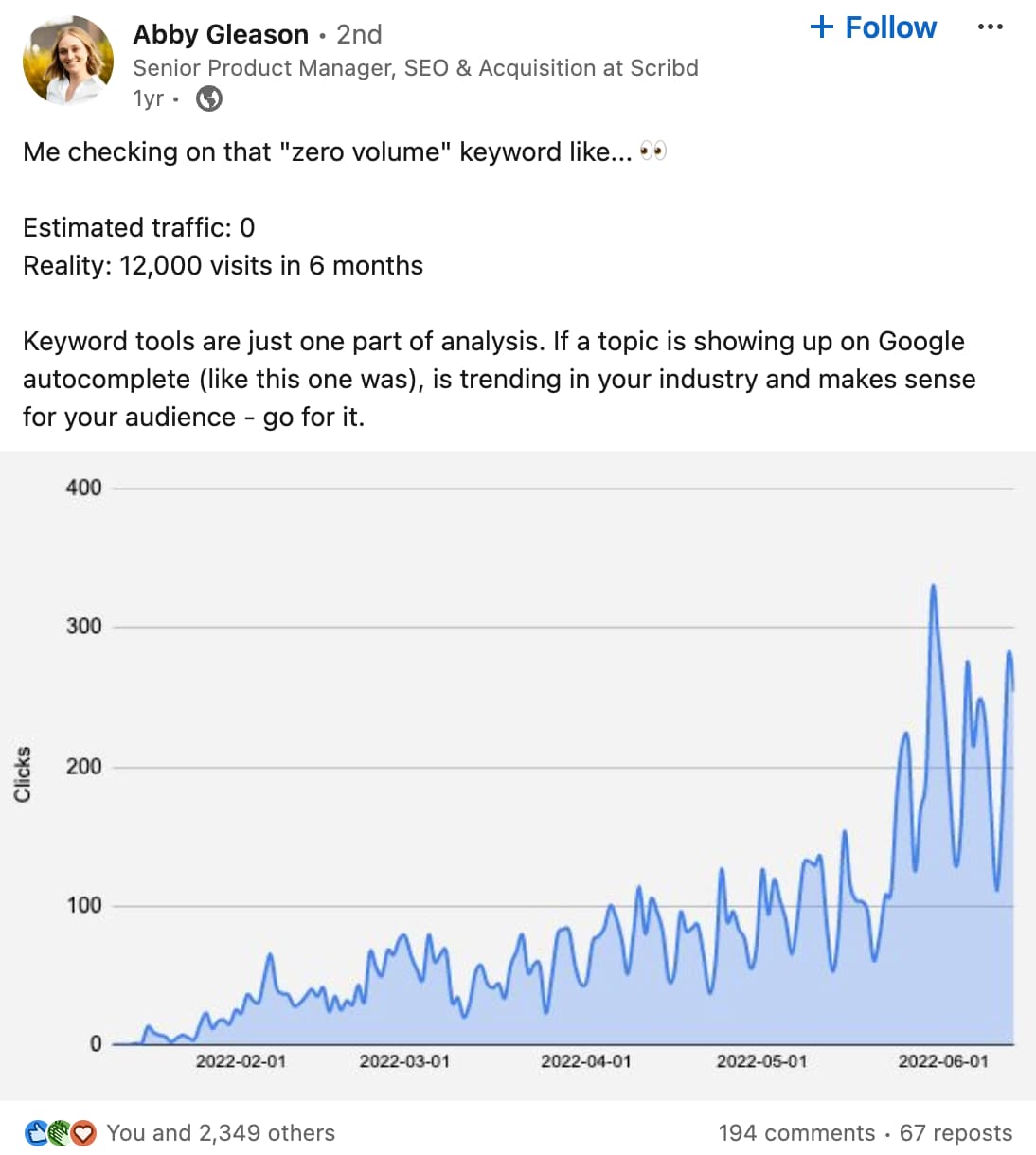
In the relentless pursuit of high search volumes and competitive keywords, zero volume keywords often remain unnoticed. These search terms that keyword tools report as having no monthly searches could be your biggest untapped opportunity.

Here's a striking fact: 92% of all keywords have fewer than 10 searches per month, according to recent SEO research from 2025. Yet these low-volume terms often deliver the highest conversion rates because they capture specific user intent.
This guide will show you exactly how to find, evaluate, and leverage zero volume keywords to transform your SEO strategy in 2026.
What Are Zero Volume Keywords?

Zero volume keywords are search terms that keyword research tools like Ahrefs or SEMrush report as having no measurable monthly search volume. But here's what most SEOs miss: these tools estimate volume based on historical data, which often fails to capture emerging trends or hyper-specific queries.
Key characteristics of zero volume keywords:
- Highly specific: They target exact user needs rather than broad topics
- Low competition: Most competitors ignore them, making ranking easier
- High intent: Users searching these terms often know exactly what they want
- Emerging potential: Many represent new trends before tools detect them
According to Embryo's 2025 research, long-tail keywords (which often include zero volume terms) drive 70% of all search traffic and have an average conversion rate of 36%—compared to just 11.45% for typical landing pages.
Why Zero Volume Keywords Matter in 2026

The SEO landscape has shifted dramatically. With 58-60% of Google searches now resulting in zero clicks according to Click Vision's 2025 data, ranking for high-volume keywords doesn't guarantee traffic like it used to.
Zero volume keywords offer distinct advantages:
Lower Competition, Higher Rankings
While everyone fights for "running shoes," you can dominate "best running shoes for flat feet marathon training." The user searching that specific phrase is ready to buy—and you'll likely be the only result targeting it.
Voice Search Optimization
Voice queries average 29 words in length compared to 3-4 words for text searches, according to DemandSage's 2026 statistics. These conversational queries often register as zero volume but represent growing search behavior. With 157 million US voice assistant users expected by 2026, optimizing for these longer queries positions you ahead of competitors.
AI Search Visibility
As AI-powered search experiences expand, content that precisely answers specific questions gets featured more prominently. Zero volume keywords naturally align with the specific, conversational queries AI systems prefer to surface.
8 Proven Strategies to Find Zero Volume Keywords

1. Mine Google Search Console Data
Your own Search Console data reveals terms already driving impressions and clicks—even when tools show zero volume. Export your search queries and look for specific, long-tail terms with consistent impressions.
Use SEOmator's Free Keyword Research Tool to cross-reference these findings and identify related opportunities.
2. Leverage Google Autocomplete and People Also Ask
Start typing queries in Google and observe autocomplete suggestions. The "People Also Ask" boxes reveal real questions users ask—many of which show zero volume in keyword tools but represent genuine search demand.
3. Analyze Customer Conversations
Your sales and support teams hear the exact language customers use. Review:
- Support tickets and chat logs
- Sales call recordings
- Email inquiries
- Product reviews and feedback
These conversations contain keyword gold that no tool can detect.
4. Monitor Trend Platforms
Platforms like Google Trends, Pinterest Trends, and even TikTok reveal emerging topics before they register in keyword tools. Early adoption means ranking before competition arrives.
5. Explore Niche Communities
Reddit, Quora, industry forums, and Facebook groups contain the authentic language your audience uses. Pay attention to how people phrase their problems and questions.
6. Use Your Site's Internal Search
What are visitors searching for on your site? Your internal search data reveals specific needs your audience has—and content opportunities you might be missing.
7. Conduct Customer Interviews
Direct conversations with customers uncover terminology and questions that analytics can't capture. Ask how they'd search for solutions to their problems.
8. Apply Industry Expertise
Your deep knowledge of your field helps you predict emerging queries. Technical terms, new product categories, and industry-specific problems often appear as zero volume initially.
How to Integrate Zero Volume Keywords Into Your Strategy

Create Dedicated Content
Write focused articles answering specific zero volume queries completely. Use SEOmator's blog as a model for creating in-depth, targeted content.
Build Topic Clusters
Group zero volume keywords around pillar topics. A main page on "running shoes" can link to specific articles targeting:
- "best running shoes for flat feet marathon"
- "running shoes for overpronation beginners"
- "trail running shoes for wide feet muddy conditions"
Optimize Existing Content
Add sections to existing articles that address zero volume queries. This expands your content's reach without creating entirely new pages.
Balance Your Portfolio
Don't abandon high-volume keywords entirely. The ideal strategy combines:
- High-volume terms: Brand awareness and traffic
- Medium-volume terms: Consistent, qualified traffic
- Zero-volume terms: High-conversion, low-competition wins
Measuring Zero Volume Keyword Success

Traditional metrics don't always capture zero volume keyword value. Focus on:
- Search Console impressions and clicks: Real performance data regardless of tool estimates
- Conversion rates by landing page: Zero volume content often converts higher
- Time on page and engagement: Specific content tends to hold attention
- Ranking velocity: How quickly you reach top positions
Run your site through SEOmator's SEO audit to track how zero volume keyword content performs over time.
Common Mistakes to Avoid
Ignoring Search Intent
A zero volume keyword is only valuable if it matches genuine user intent. Verify that people actually need this information before creating content.
Over-Optimizing
Don't stuff zero volume keywords unnaturally. Write for humans first—the specificity of your content will naturally incorporate these terms.
Neglecting Content Quality
Low competition doesn't mean low effort. Google's helpful content guidelines apply equally to all content. Create genuinely useful resources.
Expecting Instant Results
Some zero volume keywords represent future trends that haven't peaked yet. Give your content time to gain traction as search behavior evolves.
Conclusion: Your Hidden SEO Advantage
Zero volume keywords represent one of the most overlooked opportunities in modern SEO. While competitors fight over crowded, high-competition terms, you can capture highly targeted traffic that converts at significantly higher rates.
The key takeaways:
- 92% of keywords have under 10 monthly searches—that's a massive opportunity pool
- Long-tail keywords convert at 36% compared to typical 11.45% rates
- Voice search queries average 29 words, creating more zero-volume opportunities
- Lower competition means faster rankings with less effort
Start by auditing your existing Search Console data, talking to your customers, and exploring the specific language your audience uses. The hidden gems are waiting—you just need to know where to look.
Ready to discover your zero volume keyword opportunities? Start with SEOmator's Free Keyword Research Tool to uncover the terms your competitors are missing.
Frequently Asked Questions
Do zero volume keywords actually drive traffic?
Yes. Keyword tools estimate volume based on limited historical data. Many zero volume keywords receive consistent searches that tools simply don't detect. Google Search Console often reveals these terms already driving traffic to your site.
How many zero volume keywords should I target?
There's no fixed number. Focus on relevance and intent rather than quantity. A handful of highly relevant zero volume keywords can outperform dozens of generic terms.
Should I stop targeting high-volume keywords?
No. A balanced strategy includes both. High-volume keywords build awareness, while zero volume keywords capture high-intent traffic ready to convert.
How long until I see results from zero volume keywords?
Often faster than high-volume terms due to lower competition. However, some zero volume keywords represent emerging trends that may take months to gain search volume.
Are zero volume keywords the same as long-tail keywords?
They overlap significantly but aren't identical. Many zero volume keywords are long-tail, but not all long-tail keywords show zero volume. The distinction is in what tools report, not the keywords themselves.





